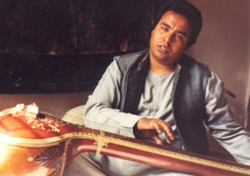 The Dagar lineage goes back to ancient centuries in history, with the foremost member known to have been a contemporary of Swami Haridas, guru of Tansen. However, the leading initiator was another man, who is supposed to have transferred to Islam from Hinduism. From then on, the family had no looking back, with generations after generations turning out to be gifted singers, ingrained with the melodious vocal wonder. Sometimes they were paired contrasts, with a masculine voice competing with a mellowed counterpart. However, standing amongst all odds, the Dagar family has successfully preserved their traditional gharana, in times of extreme unfriendliness and adversity.
The Dagar lineage goes back to ancient centuries in history, with the foremost member known to have been a contemporary of Swami Haridas, guru of Tansen. However, the leading initiator was another man, who is supposed to have transferred to Islam from Hinduism. From then on, the family had no looking back, with generations after generations turning out to be gifted singers, ingrained with the melodious vocal wonder. Sometimes they were paired contrasts, with a masculine voice competing with a mellowed counterpart. However, standing amongst all odds, the Dagar family has successfully preserved their traditional gharana, in times of extreme unfriendliness and adversity.
The Dagar family is the custodian of the Dagar-bani style of singing and is, by general consent, considered the finest exponent and perpetuator of the dhrupad. They trace back their origins to a certain Brij Chand from the village of Daguri, near Delhi. He was possibly a contemporary of the celebrated saint-singer, Swami Haridas, the guru of Tansen. In all, they claim to have produced 19 generations of singers - an ancient tradition of 400 years. The founder of this gharana was a Hindu, Baba Gopal Das, who converted to Islam during the reign of emperor Mohammed Shah and adopted the name Imam Baksh Khan. Yet the most celebrated dhrupadiya of this tradition recorded in history is Behram Khan (1753-1852). He was linked with the Jaipur court. He was not only a famed singer, but also a musicologist and scholar of repute. His grandnephews, Allah Bande Khan of Alwar (1845-1927) and Zakiruddin Khan of Udaipur (1840-1932), contributed extensively in keeping their tradition alive. They were court musicians in the Udaipur court and performed together as vocal duo. Later, Allah Bande Khan moved over to the Alwar court. It was pronounced that the duo were like the sun and the moon on the sphere of dhrupad. The masculine style of Zakiruddin`s, compared to the sun, was complemented by the softer and imaginative refinement displayed by his brother. It is said that the duo introduced the meditative and stately alaap, so distinctive of the Dagar gharana, in addition to integrating certain techniques from the rudra veena.
All of Allah Bande Khan`s sons turned out to be gifted dhrupad singers. Yet, of the four sons, Nasiruddin Khan (1895-1936) was exceptionally brilliant, endowed as he was with sensitive voice and imaginative artistry. It is stated about Nasiruddin`s command over the notes that it was so complete that he could sing the aroha and avaroha of various ragas in fast tempo and could switch from one raaga to the next, without any difficulty. Allah Bande Khan`s second son, Rahimuddin Khan was the first to add the suffix `Dagar` to his name. This patronymic was soon adopted by the rest of the family.
Nasiruddin Khan left behind four musically endowed sons, Nasir Moinuddin (1921-1967), Nasir Aminuddin (b. 1923), Zahiruddin (1932-1994) and Faiyazuddin (1939-1989), popularly known as the Dagar brothers. Nasir Moinuddin and Nasir Aminuddin were a popular duo, who formed an excellent combination. Nasir Moinuddin, who expired at a young age, possessed a flexible voice and a fertile imagination, whereas Aminuddin had an attractive and pulsating bass. The two gave numerous dazzling recitals in several parts of the country, during the 1950`s. Zahiruddin and Faiyazuddin performed in umpteen national and international venues. After the death of his brother, Zahiruddin sang with his exceedingly talented nephew, Wasifuddin (b. 1969), until his demise in 1994. Zakiruddin Khan`s son, Zia Mohiuddin Dagar (1929-1990) was possibly one of the greatest exponents of the rudra veens in the 20th century. The Gundecha bandhu, Ramakant and Umakant, trained by Ustad Fariduddin and Ustad Zia M. Dagar, are the most outstanding dhrupadiyas of the younger generation.
In post-Independence India, the Dagar brothers have ingenuously upheld and openhandedly circulated the highest classical principles associated with dhrupad, even during the most hostile and leanest of times, when it appeared that the form would be snuffed out for lack of cultural patronage and a knowledgeable audience. That is no mean feat, given the character of the present times.




